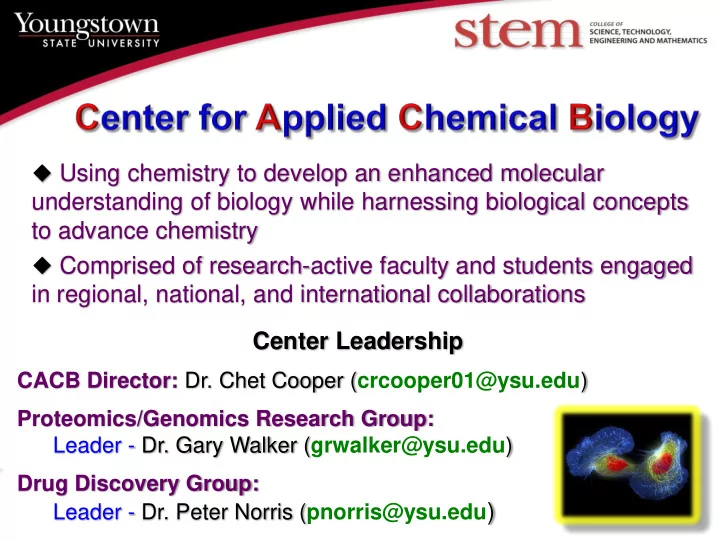

Using chemistry to develop an enhanced molecular understanding of biology while harnessing biological concepts to advance chemistry Comprised of research-active faculty and students engaged in regional, national, and international collaborations Center Leadership CACB Director: Dr. Chet Cooper ( crcooper01@ysu.edu ) Proteomics/Genomics Research Group: Leader - Dr. Gary Walker ( grwalker@ysu.edu ) Drug Discovery Group: Leader - Dr. Peter Norris ( pnorris@ysu.edu )
Scope of Activities Explore the fundamental mechanisms of cellular growth and metabolism; Generate new biomaterials for use in industrial and medical applications; Discover new targets for potential therapeutic interventions; Develop novel chemical and biological interventions for treating diseases as well as remediating environmental challenges; and Employ advanced techniques to assist forensic and bioengineering investigations.
Collaborations and Resources Academic Collaborations: Chiang Mai University, Thailand; Ohio University; Northeastern Ohio Universities College of Medicine and Pharmacy; University of Texas; Concordia University, Canada Commercial Collaborations: Celvida (Boardman, OH), Sanitizer (Salem, OH), Rust Belt Brewery (Youngstown, OH), IMMY (Norman, OK), STROX Biopharmaceuticals (Wellington, FL) Commercialization: Youngstown State University Research Foundation (YSURF) established in October 2010
Available Technology/Areas of Expertise Proteomics/Genomics Research Group: The use of innovative proteomic and genomic tools to address mechanistic questions in biological systems, including bacteria, fungi, and stem cells. Drug Discovery Group: The use of molecular and analytical technologies to uncover potential targets for chemotherapeutic interventions of infectious diseases, as well as understanding the mechanisms involved in host response to disease/trauma. Other Areas: Biomathematics, bioinformatics, micro/nano-fluidic systems, fermentation technology, mathematical modeling
Recommend
More recommend